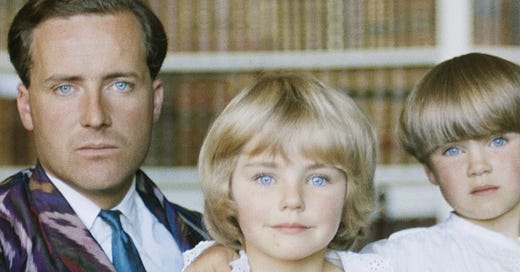Nepotism is good
Parents: it’s time to shamelessly engage in nepotism again - without spoiling your children
Nepotism is natural and good - when it’s done right. It’s time it made a comeback.
I’ve compiled a playbook to achieve the best for your children, and not spoil them. This is informed by my experience interacting with highly successful families, and supplemented by studies on the subject.
I will discuss both family-owned businesses and nepotism in more diffuse networks.
Why is nepotism good?
I. It’s good for your family
Done right, nepotism allows families to work together multi-generationally. It keeps families local, tied together, seeing each other regularly, and sharing a destiny. Children aren’t forced to move to wherever they can get opportunities.
As Professor John A. Davis, who has led family enterprise programs at Harvard Business School and MIT Sloan School of Management, notes:
A stable, committed, active ownership group is one of the treasured competitive advantages of family businesses. When harnessed, a family ownership group’s inherent characteristics—its long-term mentality and investment horizon, patient capital, progressive owner-management, favoring of the company’s goals over those of an individual, special connection and historical bonds to the business for more than financial reasons, and sense of purpose to be dutifully responsible stewards of the company—contribute to the explanation of why family-owned companies generate higher returns than non-family companies, on average, and are economic growth engines and anchors in their communities.
— John A. Davis, Enduring Advantage: Collected Essays on Family Enterprise Success
Pursuing this model builds a family reputation for excellence within a field that gives your descendants pride, identity, and purpose. It gives you, as a parent, confidence that you are passing your legacy on to someone who will value it.
In terms of what you can leave your children as an inheritance, a good career is a more productive mode than leaving them liquid capital, which asks nothing of them and can be squandered.
And family businesses, if this is the form of nepotism you choose to pursue, can be highly productive ventures:
“One might suspect that after the founder stage, to continue to grow their wealth, families would more reliably achieve better returns if they sold their family business and became passive owners of assets managed by others. This is not shown in our research. The families that best continue growing their wealth over generations generally remain highly concentrated in operating businesses that they control and lead…
What’s more, companies that a family controls generate more loyalty and sense of responsibility from the owning family, and usually help more to meet other family goals, such as the development of family talent.”
— John A. Davis
II. It’s good for your children
Training children for a specific industry allows them to start working and contributing productively at a young age. This is often a better education than a generic study grind which is largely forgotten in the years that follow. It provides the psychological satisfaction of meaningful work early in one’s career, as well as the experience of collaborating with adult professionals as peers.
An early focus may be conducive to eventual genius in that field (as was argued by the father of the strongest female chess player of all time, Judit Polgar, whose sister Zsuzsa also became the second strongest female player in the world after Judit).
Providing your children with a job allows them to cut through the worst excesses of the conventional elite pipeline of exam cramming and resume stuffing. Often, this process, which consumes youth with make-work, culminates in bad hiring mechanisms which have been overwhelmed by the noise of hundreds of applicants, bad CV selection algorithms, HR filtering, DEI, and the ethnic nepotism already happening in many minorities.
If it turns out that, after an initial period, your field isn’t for your child, so be it - they can leave with strong work experience and a sense of what professional excellence looks like.
So what are the strategies which make the difference between nepotism strengthening and spoiling the child?
Keep reading with a 7-day free trial
Subscribe to Becoming Noble to keep reading this post and get 7 days of free access to the full post archives.




